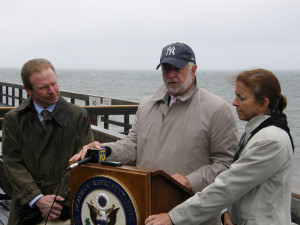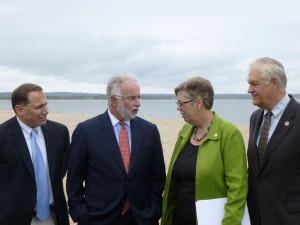We have much more to do and your continued support is needed now more than ever.
Protecting Clean Water Helps Our Economy
This is a guest post by Congressman Tim Bishop (D-NY), Ranking Member of the Subcommittee on Water Resources and the Environment.
In times of economic hardship, politicians who prioritize special interests over environmental protections are quick to overstate costs while understating the savings and numerous benefits associated with clean water and clean air. This longstanding and troubling misinformation campaign, often articulated through political sound bites and bumper sticker slogans, has been on the rise since the economic downturn in 2008 and the emergence of the Tea Party in 2009. In the 112th Congress, a common theme often heard in the hallways on Capitol Hill references how “job-killing regulations” and “regulatory overreach” are stifling economic growth. However, these claims are rarely substantiated with empirical evidence. In most cases official estimates recognize immense savings rather than significant costs.
Clean Water Supports Jobs

According to the U.S. Fish and Wildlife Service, approximately 90.1 million U.S. residents fished, hunted, or watched wildlife in 2011. They spent over $145 billion pursuing their recreational activities, contributing millions of jobs in industries and businesses that support wildlife-related recreation.
The warm waters of the Atlantic Ocean and the Gulf of Mexico host productive fisheries for a wide variety of shellfish and finfish. In many instances juvenile fish rely on coastal waters and habitat for survival, and new generations of fish are necessary to replenish the vibrant commercial fishing industry in coastal waters, including the waters off my district in Eastern Long Island. According to the most recent report issued by the National Oceanic and Atmospheric Administration, in 2009 the US Seafood industry supported approximately 1 million full- and part-time jobs and generated $116 billion in sales impacts, $32 billion in income impacts and $48 billion in value added impacts.
Take my district for example – on Long Island the local economy is dependent on the environment. Many of my constituents rely on clean water to earn a living, either through fishing, agriculture or the businesses who serve summer visitors attracted by Long Island’s world class beaches.
More Attacks on the Clean Water Act

The drumbeat of unwarranted elimination of Clean Water Act protections continues, even as the Clean Water Act celebrates its 40th Anniversary this October. Over the past year-and-a-half, we have voted on dozens of measures to roll back or eliminate clean air and clean water protections that provide real economic benefits, real health benefits and allow for local participation in federal projects. Meanwhile, bipartisan efforts to address our most pressing environmental issues, like making long-overdue investments in our nation’s aging wastewater infrastructure, have not even been granted committee consideration.
Congress Should Protect Clean Water to Protect Our Economy and Our Future
Is there a pro-pollution agenda in the House of Representatives? I wouldn’t put it in those terms. I don’t think anyone is “pro-pollution.” But there is an unfortunate disconnect for many members of Congress regarding how best to create jobs in America. Rolling back protections on clean air and clean water is not the solution, despite what the special interests may be whispering in your ear. In fact, investing in clean water and clean air creates jobs, improves the economy, lowers health care costs and preserves a greener tomorrow for our children and grandchildren.

As a member of the House Transportation and Infrastructure Committee, Bishop has worked to protect the Long Island Sound and other waterways, as well as to bring back federal funding to improve our infrastructure and put Long Islanders to work. He has been a champion of the Long Island Sound, defeating a plan to dump contaminated dredge spoil as well as leading the opposition against a plan to industrialize the Sound and promoting legislation to protect Long Island’s shoreline and beaches.




















